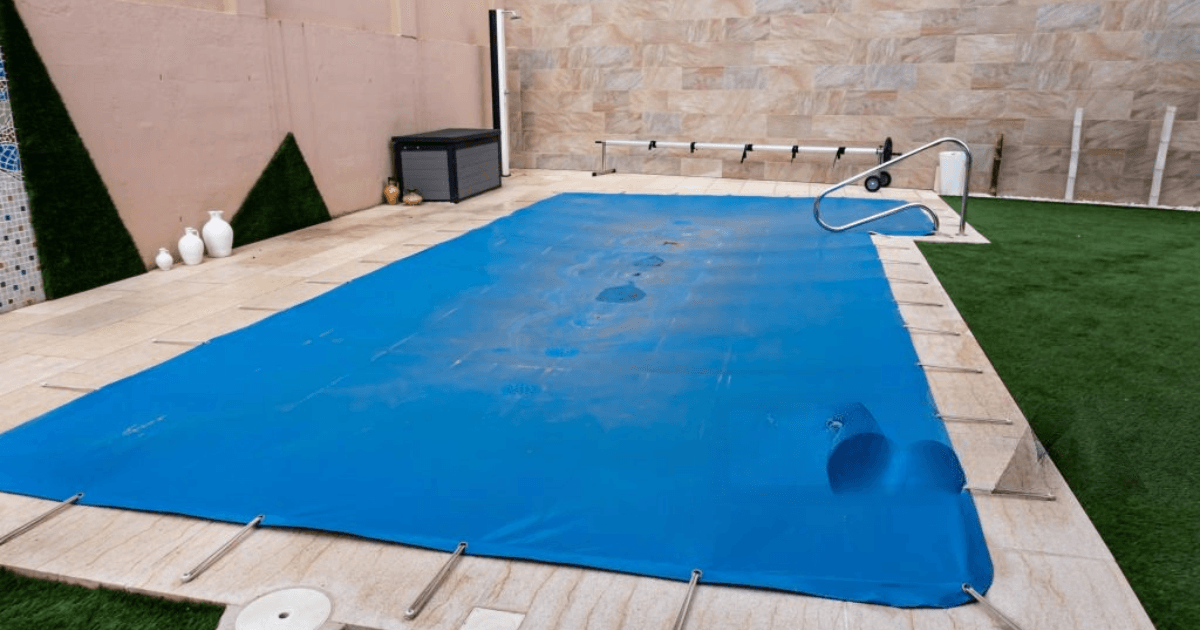Introduction
In just a few hours, algae can double their population, turning your clear pool into a swamp that looks like it happened overnight. A rapid growth of algae that turns your pool green is the worst thing that can occur during a swim. These tiny living things can quickly take over your backyard oasis. Algae not only makes your pool look bad, but it can also hold harmful bacteria. So, how do you keep your pool so clean in this case? Many people think that pool covers are an easy way to stop algae from growing. But does it work that well? Let’s discuss more about how pool covers can help keep algae away. I’ll also give you other important information in this article. Let’s turn your pool back into the relaxing spot it should be! Let’s dive in.
Why Algae Growth is a Concern for Pool Owners
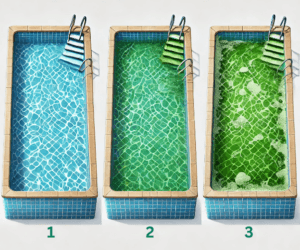
An oasis that used to sparkle can become a murky mess with algae. Not only does algae growth look bad, but it can also be bad for your health. Some types can hold dangerous bugs, which makes divers and swimmers more likely to get sick. Accidents can also happen around the pool because the ground is slippery. In addition to being harmful to your health, algae make maintenance harder. It can clog purifiers, and devices work harder, costing you more. I’ve learned that getting rid of algae quickly saves time and money in the long run. Besides, a clean pool is much more fun for family and friends. Keeping algae out of your pool keeps it safe, fun, and affordable to manage. So, cleaning your pool regularly and ensuring the chemicals are balanced aren’t just things you must do; they’re necessary to keep it in great shape and stop algae from growing.
The Science Behind Pool Covers and Algae Prevention
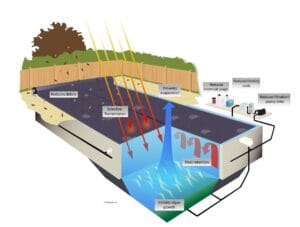
Having a cover over your pool is one of the best things you can do to stop algae from growing. Light and nutrients are essential for algae to grow. A cover keeps light out and keeps out things that could bring in nutrients. The cover stops algae from photosynthesis because it limits the amount of light in the water. Covers also keep leaves and other organic matter from falling into the pool, where they would break down and feed algae. Covering the pool is an excellent way to prevent algae growth. The right cover keeps algae from entering the pool but also keeps leaves, bugs, bacteria, and dirt from decomposing in the pool, providing algae with food. Remember that even though a cover does a great job, it’s still essential to keep an eye on the chemical balance of your pool water, even when it’s all covered up! Keeping an eye on and adjusting those chlorine and pH levels helps ensure that any algae spores that sneak in won’t have a chance. Combining the physical barrier of a pool cover with proper chemical maintenance creates a fantastic duo against algae, ensuring your pool stays clear and inviting all season long.
Debunking Myths About Pool Covers
Many things need to be clarified about pool covers. Let’s set the record straight!

Myth #1: Pool covers block all sunlight and nutrients
Pool covers minimize sunlight and debris entering the water but do not completely protect it. Some sunlight still gets through, particularly with lighter-coloured or mesh coverings. This means algae may still get part of the light they need. However, by lowering exposure, covers help slow down algae growth.
Myth #2: Pool covers alone prevent all algae growth
I wish it were that easy! Pool covers are an excellent tool but are not a miraculous answer. Algae spores may already be in the water or have been introduced via small openings. Regular chemical treatment and appropriate filtration are critical. Combining a cover with frequent maintenance provides the most effective protection against algae.
Myth #3: Pool covers cause additional maintenance issues
Some people are concerned that pool coverings make it more challenging to maintain. In reality, a decent cover limits the quantity of dirt and toxins that enter the pool. This means less time skimming leaves and more time to enjoy the water. Simply clean and preserve your cover to prevent dirt and mildew from accumulating.
Myth #4: Pool covers are only helpful in winter or for long-term closure
Pool coverings are not just for the off-season! Using a summer cover can help preserve heat, prevent water evaporation, and keep out unwanted debris. This saves money on heating while conserving water, which is a win-win situation. So, whether it’s the height of summer or the depths of winter, a pool cover is a crucial instrument in pool maintenance.
Practical Tips for Using Pool Covers Effectively
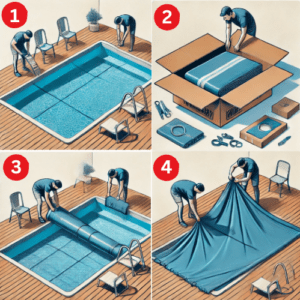
1. Proper Installation and Fitting of Pool Covers
A snug-fitting cover is essential. It keeps debris out and lowers sunlight, which helps to avoid algae growth. Measure your pool correctly and choose a cover that fits its form and dimensions. When installing, ensure it is tight and securely fastened using anchors or straps. This maintains the cover in place and improves safety.
2. Regular Maintenance Tips while Using Covers
Your pool needs care even if it has a cover. Look for tears or holes in the cover that could let dirt or dust in. Dry out standing water after it rains to keep things from sinking and sagging. Regularly brush off the dirt. Also, check the chemicals in your pool every two weeks to ensure the water is balanced.
3. When to Remove the Cover and Check Water Quality
Lift the cover promptly to check out the water. I recommend lifting it once a month. Look for indications of algae or chemical imbalance. Any difficulties should be resolved as soon as possible. Regular inspections help to detect issues early and maintain your pool fit for swimming.
By following these tips, you’ll keep your pool in excellent condition all year round!
Alternatives to Pool Covers for Algae Prevention
1. Robotic cleaners
These automated robotic cleaners scrub your pool’s surfaces, removing debris and algae. They save you time and keep your pool pristine! Investing in one can make a big difference.
2. Algaecides
Adding algaecides to your routine prevents algae growth. They target and kill spores, giving extra protection. It’s an easy addition to your maintenance schedule.
3. UV sanitation
UV systems use light to neutralize algae and bacteria. It’s a chemical-free option that keeps your water clean and reduces chlorine use. An eco-friendly choice!
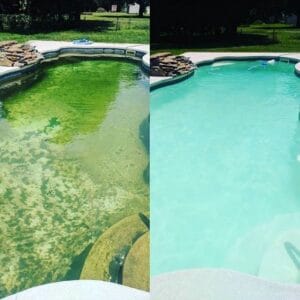
Conclusion
In conclusion, covering your pool is a fantastic way to prevent algae, those annoying little organisms that can multiply rapidly and turn your clear water into a green mess. A great pool cover helps keep sunlight out and prevents debris from getting in, reducing algae’s chance to grow! Keep going! It’s essential to regularly check your pool’s chemical balance and stay on top of maintenance! Using a quality cover and some proper care helps keep pools sparkling and inviting throughout the entire season. Work harder to keep your backyard oasis looking great, cover it up, take care of those chemicals, and enjoy crystal-clear waters whenever you want! Share your thoughts or explore further.
Frequently Asked Questions (FAQs)
1. Is it better to keep a pool covered or uncovered?
It’s better to keep your pool covered when not in use. Covering your pool reduces evaporation, conserves water, and can save up to 70% on heating costs. It also removes debris and lowers maintenance time, making it a cost-effective and efficient choice.
2. How do I prevent algae in my pool?
To prevent algae, maintain proper water chemistry by keeping pH levels between 7.2 and 7.6 and alkalinity around 80–120 ppm. Run your filtration system daily and add a weekly dose of algaecide as a preventive measure. Regular testing and balancing of your pool water stops algae before it can grow.
3. What is the disadvantage of pool cover?
One disadvantage of some pool covers, like mesh covers, is allowing rainwater and acceptable debris to enter the pool. When reopening, this can lead to dirty or cloudy water, requiring extra cleaning and chemical adjustments, which adds to your maintenance efforts.
4. Will a pool turn green with a cover?
A pool can still turn green even when covered if proper water chemistry isn’t maintained. Algae can grow under the cover if chlorine levels are too low or the cover allows sunlight to penetrate, promoting algae growth.
5. Will algae grow if pool is covered?
While covering your pool reduces the risk of algae by blocking sunlight and debris, algae can still grow if the water chemistry isn’t correctly balanced. Maintaining adequate chlorine levels and proper pH is essential to prevent algae growth, even when the pool is covered.
